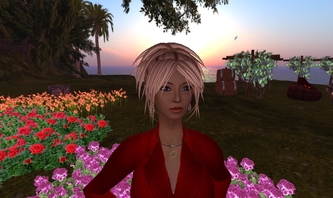With that said, the article that I decided to start with today is Jennifer deWinter and Stephanie Vie's "Press Enter to 'Say': Using Second Life to Teach Critical Media Literacy." Second Life is my area of study, so I thought this was perfect to begin with. I'll start by simply saying that in the margin on the front page I wrote "Seems like most of this article is underlined!! Sign of a good article for me!!!" And it is. I find if I am underlining and writing a lot in an article, then it is one that has engaged me. In the abstract of this article, deWinter and Vie state that they will "argue that students need to develop critical awareness of their own subject formation and their position in new media environments" and they "further contend that composition instructors can look to Second Life . . . as a dynamic text to engage students in questions regarding power, ethics, intellectual property, and community" (313).
I couldn't agree more with these statements. As someone who has used Second Life to teach first year composition, I have witnessed students engaging in these types of dynamics. An SL resident accused three of my students of harassing her, these same students battled with issues of power and control in this world, and others felt marginalized during assignments. I believe using the tool of SL in composition classes can teach students critical skills they will need in life.
But there are some things that deWinter and Vie mention or say that I do not believe they discuss enough or I do not agree with. The first thing is really very minor, but as an immersed resident of SL, I think it is important to point out. They use the words "play" and "player" a few times in conjunction with SL. I think perhaps they make this rhetorical move in order to connect with what James Paul Gee discusses about using video games in education. I never consider myself a player or playing when I log into SL, and I discourage my students from using that language as well. I want my students to treat this environment as another culture. To that end, I often have them keep field notes about the things they witness. If we expect students to treat the environment seriously, even at times of play within the world, I think it is important that they understand it as a different cultural experience.
The other thing that deWinter and Vie touch on briefly but I wish they would have delved into a little more is the risk involved in using SL. The authors note that "instructors must be aware that racism, sexism, and other forms of harassment may be unavoidable; as such, instructors should approach these as teachable moments to help students understand the changes that online environments have wrought on our understandings of privacy and safety" (319). This is all very true. What I think they fail to point out is that this "environment" is no different than taking students into third world countries to perform research, or just down the street. I think if SL is approached as research, and the possibilities discussed, taking students into SL should be not more of a legal issue than taking students to other cultures to learn. Just as we cannot control our students' lives once they leave our brick and mortar classrooms, we cannot control what they do in SL outside of class. That is life. At least they can simply log off if they find themselves threatened in SL. One cannot log out of real life situations.
deWinter and Vie's article has succeeded in validating my own ideas about using SL in the composition classroom. So many things can be explored in this environment that simply cannot be in RL. Want to queer something? Take a walk into SL and queer away. Want to challenge authority? You can do it with little risk. This was the perfect article for me to begin my journey of 260 days of learning.
The article can be found on ScienceDirect but requires a subscription through a library.

 RSS Feed
RSS Feed

